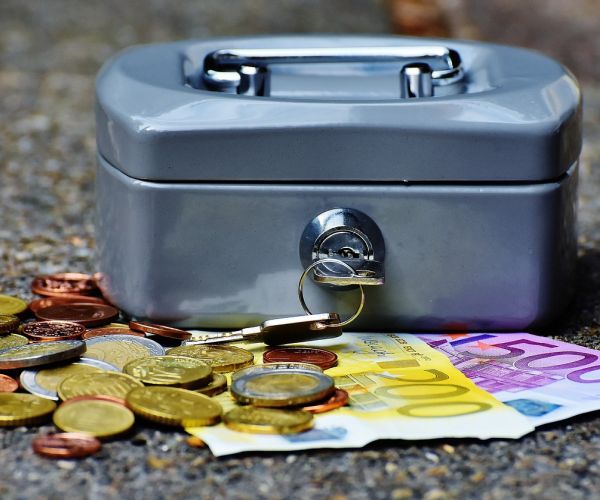
|
The impact of high inflation and how to deal with it in a modern economy
Problems for businesses & consumers | Banks, government & EU action

High inflation is a phenomenon with far-reaching consequences for the economy. It affects both businesses and consumers and requires targeted action by banks and governments.
But what happens when inflation is high and what problems do businesses and consumers face? What do banks and governments need to do, and how is inflation managed in the European Union?
Effects on consumers and businesses
High inflation means that money is constantly losing purchasing power. This means that the same amount of money buys fewer and fewer goods and services. This process is usually gradual, but can take on dramatic proportions in runaway inflation. Instead of rising a few percentage points a year, prices can double or multiply in a short space of time.
Consumers feel the effects of inflation particularly acutely. When they go shopping, they are surprised by rising prices for food and other everyday items. Rents and energy prices are also rising, while wages and salaries are not increasing at the same rate. The result is a real loss of purchasing power. Low-income earners and pensioners are particularly affected, as they have to spend a larger proportion of their income on essential goods. Savings also continue to lose value due to inflation if the interest rate is below the rate of inflation.
High inflation creates several problems for businesses. First, they have to cope with rising raw material, energy and wage costs. These cost increases cannot always be fully passed on to customers, reducing profit margins. In addition, investment planning becomes more difficult as future costs and revenues are harder to calculate. Inventory levels often have to be reassessed, adding to the administrative burden.
Companies also tend to invest less or postpone existing projects, which in the long run slows down economic development. Small and medium-sized enterprises in particular are often hit harder, as they have fewer financial reserves and less scope for price increases.
The uncertainty associated with high inflation can also lead to a loss of confidence. Consumers and businesses lose confidence in the stability of the currency and move their money into more stable assets, such as property or foreign currency. These changes in behaviour can further fuel inflation by increasing demand for certain goods and services.
Action by banks and governments

Both banks and governments are called upon to combat the negative effects of high inflation. Central banks, such as the European Central Bank (ECB), have an important role to play. One of the most common measures is to raise interest rates. Higher interest rates restrict the supply of credit and lead to less money in circulation. The aim is to reduce inflation by making less money available for consumption and investment.
But there are risks. Too high interest rates can slow economic growth by making it harder for businesses to borrow for investment. Households can also suffer if, for example, mortgage rates rise.
The government can also intervene through fiscal policy. One option is to reduce public spending or raise taxes to dampen the overall economy. Such measures are often unpopular and may face public opposition. At the same time, however, governments need to ensure social security so that the poorest in particular are not disproportionately affected. Governments can provide targeted support to vulnerable groups, for example by subsidising energy costs or adjusting social benefits.
Regulation in the European Union
The fight against inflation is particularly important in the European Union because of the common economic interests of the Member States. The ECB has sole responsibility for monetary policy in the euro area and aims to keep inflation below two per cent over the medium term. To achieve this goal, the ECB uses a variety of tools, including interest rate adjustments and unconventional monetary policy measures such as "quantitative easing" (an extraordinary tool used by central banks when interest rates have already been cut sharply to zero): the central bank buys securities on a large scale.
However, the economic situation can vary from country to country, which adds to the challenge. Some countries may be suffering from hyperinflation, while others are struggling with extremely low inflation or deflation. The ECB therefore has to find a balanced approach that meets the different needs of Member States.
Another important element is the coordination of Member States' fiscal policies. Under the Stability and Growth Pact, Member States are obliged to adhere to certain budgetary disciplines in order to avoid excessive debt. This should help to ensure economic stability in the euro area as a whole and minimise the risk of inflation.
Comparing the approaches of banks and governments

Banks and governments tackle the problem of high inflation in different ways, although the two approaches are to some extent complementary. Banks rely mainly on monetary policy measures, while governments use fiscal policy instruments. However, there is a significant difference in the speed of response. Central banks can react relatively quickly to economic changes by adjusting interest rates or launching special programmes. Government measures, on the other hand, often require longer decision-making processes and political coordination, which limits flexibility.
Another difference is the objective. While banks are primarily concerned with monetary stability and inflation control, government measures often have a social dimension. The government must ensure that its measures do not exacerbate social inequalities.
High inflation is a multi-dimensional phenomenon
Both businesses and consumers face major challenges. The necessary measures to be taken by banks and governments are complex and need to be carefully weighed in order to minimise the negative impact on the economy and society.
In the long term, low and stable inflation is important for the functioning of the economy. It allows reliable planning, protects savings and prevents social upheaval. However, the current situation shows that the fight against inflation remains an ongoing challenge that requires flexible and coordinated responses.
The success of these measures will depend on how well the different institutions work together and how quickly and effectively they can react to economic circumstances. This is the only way to find a sustainable solution that meets the different needs of Member States while keeping the well-being of citizens in mind.
Experience in recent years has shown that traditional explanations and strategies for fighting inflation are not always sufficient. New factors such as global supply chains, digital currencies and climate change influence price developments and require innovative approaches to monetary and economic policy. The EU and its Member States need to tackle these challenges together, ensuring both economic stability and social balance.
© "The impact of inflation and how to deal with it in a modern economy": An article by Izabel Comati, 12/2024. Image credits (top): Euro Banknotes, (middle) European Central Bank Frankfurt, (bottom) Cash box with euros, all images CC0 (Public Domain Licence).
– Is mankind ready to become cooperative?
– Master Till and the local press (Short story)
– On the art of Maria Marachowska
Discover more articles! Use the search function:
English archive:
More reviews, book presentations and essays
2024/2025
German archive:
2024 |
2023 |
2022 |
2021 |
2020 |
2019 |
2018 |
2017 |
2016 |
2015 |
2014 |
2013 |
2012 |
2011 |
2010 |
2009
Become a writer for Pressenet! Write articles for our online magazine on trending topics such as best books to read, health and wellness, technology and gadgets, business and finance, travel and tourism, lifestyle and fashion or education and career. Info: Become an author
Sponsors and investors are welcome: If you found our articles interesting, we would be grateful for a donation. Please also recommend us to your networks. Thank you very much!
Sitemap About Privacy Policy RSS Feed





